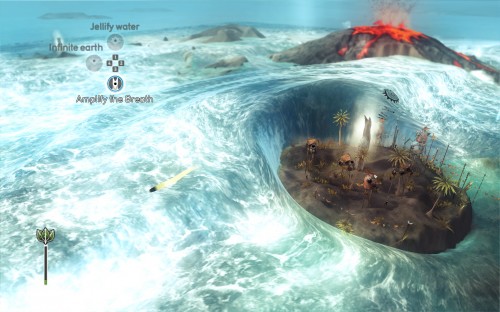TOM FRANCIS
REGRETS THIS ALREADY
Hello! I'm Tom. I'm a game designer, writer, and programmer on Gunpoint, Heat Signature, and Tactical Breach Wizards. Here's some more info on all the games I've worked on, here are the videos I make on YouTube, and here are two short stories I wrote for the Machine of Death collections.
Theme
By me. Uses Adaptive Images by Matt Wilcox.
Search
NaNoWriMo – Hard FAQs
I wrote the chapter plan for my National Novel Writing Month novel tonight, and in two minutes it’ll be November and I’ll write the first sentence. Then I’ll pass out because I’m really tired.
I’ve decided I will post it online, but not here. It’ll be to an unlinked page on this site, which won’t get indexed by Google, but absolutely anyone who’d like to read it should e-mail me or comment here (and fill in the e-mail field – it won’t be published) and I’ll send them the URL. In other words, it’s not secret but it’s not public either. The first chapter will hopefully go up two nights from now. I’ll upload it chapter by chapter I think.
NaNoWriMo
I’m going to write a book in November. That sounds pretty ridiculous, considering I’ve never finished a book in my life (despite repeated attempts), and November – while not a short month – is not a reasonable time-frame. But I’m not the only one planning to do this, and nor am I expecting it to be a good book – more of a fictional blog. I’ve signed up for the pleasantly concatenated National Novel Writing Month, in which chumps and wannabes claim they will pen 50,000 words in thirty days flat. Interesting things about this are that the site itself tracks the cumulative word count of everyone involved so far, and a few of us are planning to launch our works in the extraordinary blacklibrary.
You’ll notice I sound optimistic, and also that this patently isn’t going to work. True enough, but there is one not entirely unrealistic expectation that appeals to me: I might end up writing the story I have in mind into a novella, way short of the word minimum but getting to the ultimate point. The plot is something that rose from the ashes of my old book, which was floored by a fatal flaw in the sci-fi reasoning. This new one is a sci-fi private detective type of yarn, and not as fanciful in some ways as the basics of the last one, but larger in scale and more diverse. The weird thing about it is that I haven’t written a word. Usually I start these things soon after having the idea, then stop for months at a time after every chapter. I think the main thing stopping me from writing a book is the way that I stop writing books or don’t start them at all. Solving that would really help.

Naming Drugs Honestly In Big Pharma
I’ve been playing Big Pharma, a game where you design production lines to manufacture cures to sell for maximum profit, or to genuinely help people, as your fancy may dictate. It’s excellent and I have become hopelessly addicted to it, but my favourite part is having to come up with names for the often double-edged drugs your imperfect process has produced: Continued
N
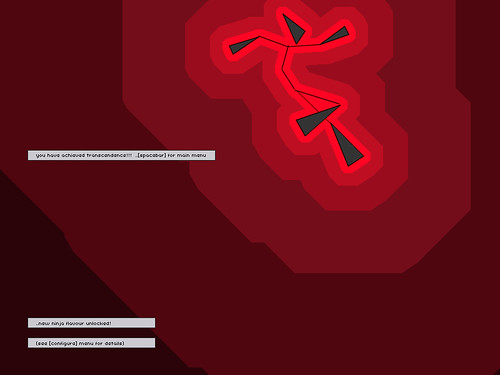
The Basics
2D side-on non-scrolling platformer in which you control a tiny black ninja. Unlike regular ninjas, this one is not all about flipping out and cutting people’s heads off – instead, he his about avoiding stuff, collecting gold (to extend his lifespan) and getting to the door to the next room so he can play air guitar, dance, punch the sky, run on the spot or simply collapse and raise one victorious arm. In his way are an array of instakill obstacles: mines, drones, seeker-drones, sniper turrets, laser turrets, machinegun drones. These things have proper in-game names, and I know them because I am cool, but these are more descriptive.
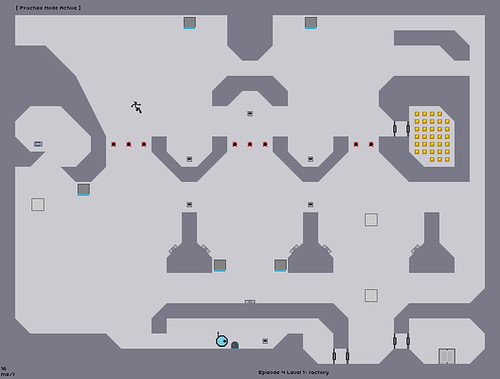
The Appeal
Moving is fun in N. It’s physics-driven, so factors like momentum and friction affect your trajectory. Picking up speed, bouncing off walls, hitting jump pads and surviving huge falls is just pure joy. You can feel the weight of the ninja, thrill at his velocity and scream as you feel the inevitability of his demise, then sob as his limp ragdoll corpse is tossed cruelly around by the objects you so carefully avoided – with one important exception – in life.
The fact that the game gets extraordinarily hard before its five hundred levels are up means that you’ll get stuck and have to redo some levels many, many times. For reasons I’ve only just recently come to understand, it doesn’t get boring. Part of it is that moving is, as I say, fun, and successfully avoiding things even more so. But what counter-acts the repetition is that you keep getting better at these early obstacles.
It’s not like normal platformers where you just jump at the right time, wall-run for the right bit, spring off and you’re done, 10/10. In N every move you make affects the angle and speed of your next, and your weak air-control means even simple jumps are organic, fluid things in which where you want to land is constantly changing in reaction to the circling drones, the focusing cross-hair of a sniper turret, the pursuing rocket. The defense systems you’re dodging are all automated, but their reactions are never the same because your actions are never quite the same. Even if you were trying to exactly replicate your previous performance, it’s not humanly possible.
And you’re not, of course. You’re instinctively trying to do it faster and more stylishly – if you pay attention you’ll actually feel yourself getting cockier. Deservedly so – you rock. Your route through these obstacles is not merely reliable, but also embued with flair, arrogance and hurtling, blinding speed. You’ll dance effortlessly through these nerve-wrackingly hazardous spaces you know like the back of your hand, carressing walls as you fly up them, stroking the tops of deadly drones as they zoom angrily past, hugging laserbeams and bullets like old friends. Nothing can touch you and nothing can stop you, except the obstacle you’re currently working on. Which will electrocute, crush, shoot, burn and explode you again and again.
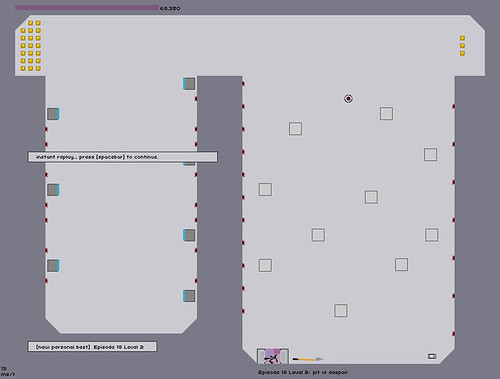
The Essential Experience
Hitting a jump-pad and, on your way up, brushing the side of a bounceblock with a gentle touch – you don’t wall-hug long enough to lose your velocity, but you do jump from it, which gives you an extra boost on your already extraordinary ascent. In N, being a fatal distance from the ground is a universe of possibilities rather than certain doom. Gaining height is both scary and exciting.
Mystery Trip
I’ve been away the last few days. It feels like about a year and a half. I’d forgotten what it felt like to be home. I caught up with the London crew the night before my flight, and then with a load of old high-school friends the day I got back (yesterday? Could it be yesterday? I feel like I’ve been home for five weeks). I’ve sort of retro-actively photoblogged it in the Flickr set. It’s this kind of thing:
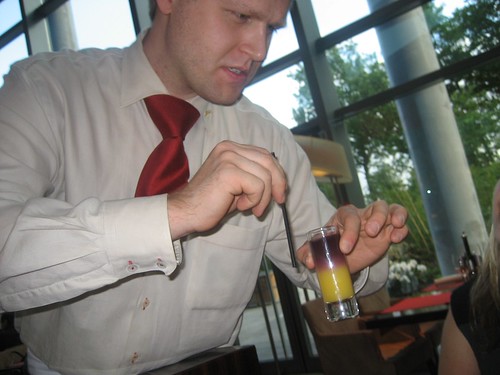
The waiter brought us two of these before what we ordered, insisting that we try them. You have to pull the straw up through the drink as you sip, so that the intake is half and half (assuming constant suction).
It was good. I asked him, after my first sip, what it was. He said it was a trade secret. I took another sip.
"Is it red wine and orange juice?"
"… yes."

My Week
This year I’ve started tracking the hours I spend programming, because generally once I start tracking something I naturally start to optimise it. I’m not a workaholic – I’m at greater risk of not putting in the hours than of putting in too many, and I’d like to make sure I’m putting in enough.
Programming is about 40% of my job. Another 40% is design, and the other 20% is every other job on a game that isn’t art or music. The design part is hard to track though: I find most productive design thinking comes from a big engine in the back while you’re doing other things, as it randomly matches disparate ideas and sprinkles them with what you’re currently experiencing and asks: “Is that anything?”
Programming, though, I can measure: I start a timer and then focus on work for anywhere from 8 minutes to 80. If I get the urge to check Twitter, I can but I have to stop the timer to do it, and only log the work time. I only get to log the time if it really was focused work – all breaks and interruptions and meals and everything else is excluded. Back when I notionally worked an 8 hour-a-day job, I had an hour for lunch, lots of Twitter breaks and interruptions. I’d be surprised if I averaged as many as 6 productive hours a day.
Anyway, here’s my first full week’s programming time tracked: Continued
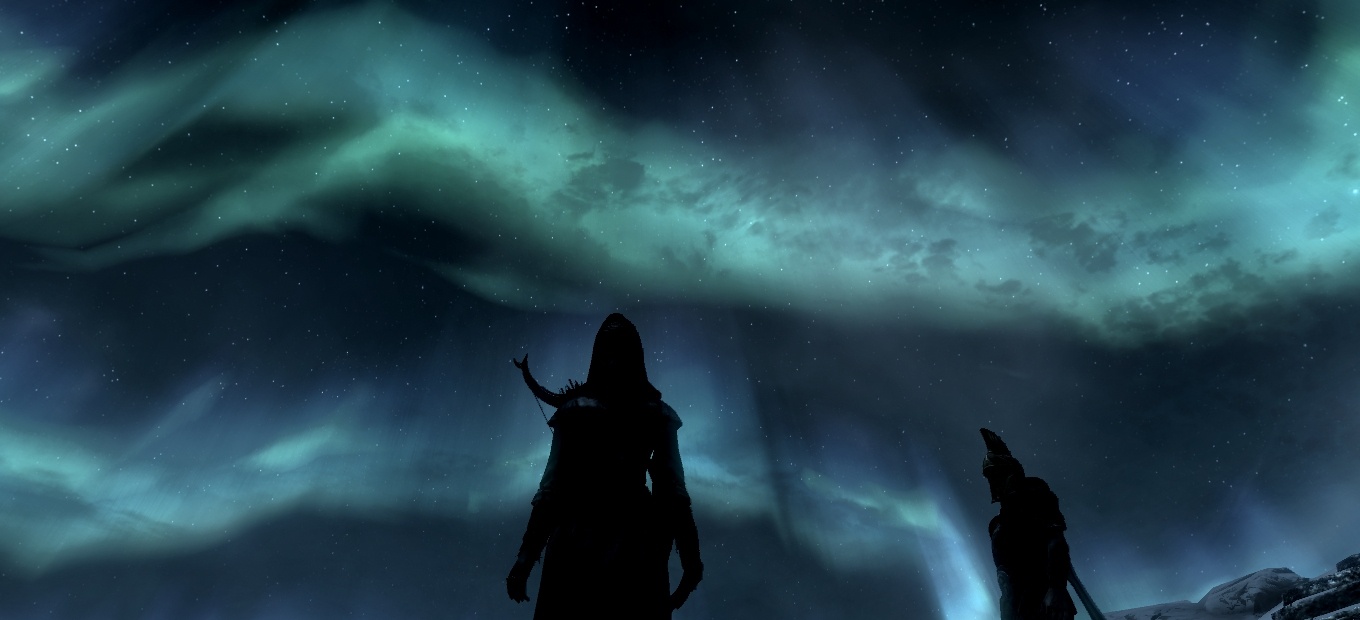
My Skyrim Review
Skyrim is out, my review is up, and it’s spoiler free.
Although I was hugely privileged to get to play this early, there is a special kind of agony to being this excited about a game and believing you’re just about to get hold of it, every day for nine days.
I was out for my parents’ anniversary dinner the night the mail finally came in, and the code was waiting when I got home late. It was going to take seven hours to download, so I set my alarm for six and went to bed.
I haven’t woken up early for Christmas since I was about 12, but for Skyrim I woke up at 4, then 4.30, then 5, then 6, then 6.30, then 7. Every time the download had about two hours to go, and it seemed to get slower as it went.
I made breakfast, tidied my room, exercised, showered, brewed coffee, did laundry, cleaned my kitchen, fretted, and then finally saw it finish. It would definitely crash. It would be encrypted. It would work, then be removed from Steam the next day.
But it worked, I had time to play it thoroughly enough to review before the embargo, and it was this good.
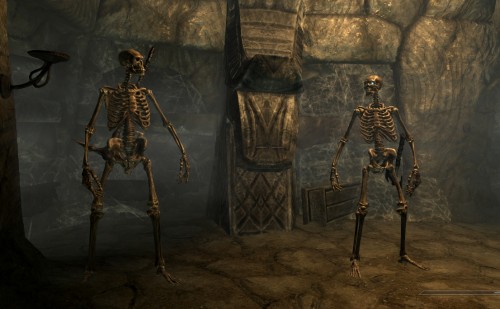 “Hey Greg, why didn’t the skeleton go to the party?”
“Hey Greg, why didn’t the skeleton go to the party?”
“Because he’s a fucking skeleton, Jen, we’ve talked about this.”
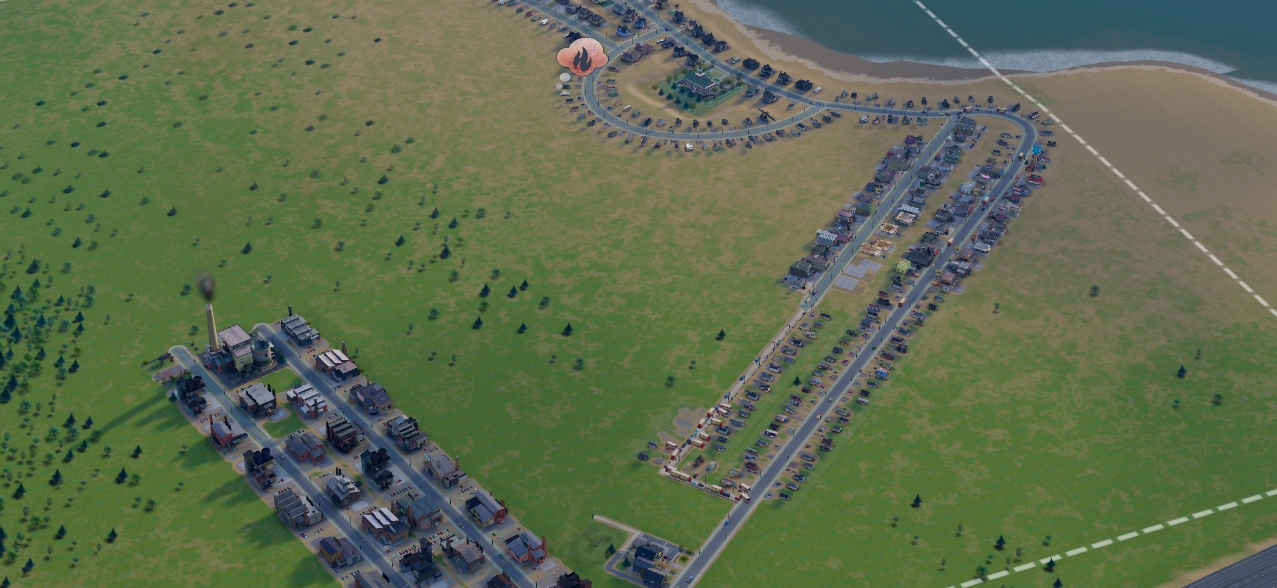
My SimCity City
The closed beta test of the new SimCity is out, for those in on it. I am! There’s the city I built!
You can see and read about Tyler’s city, built in a different region to the beta, here.
It’s a very demo-y beta: you only get 1 hour before you have to start from scratch. My first one was a single long road, but I quickly discovered that having industrial stuff anywhere near your residential zones poisons everyone and, more importantly, reduces the land value. Continued
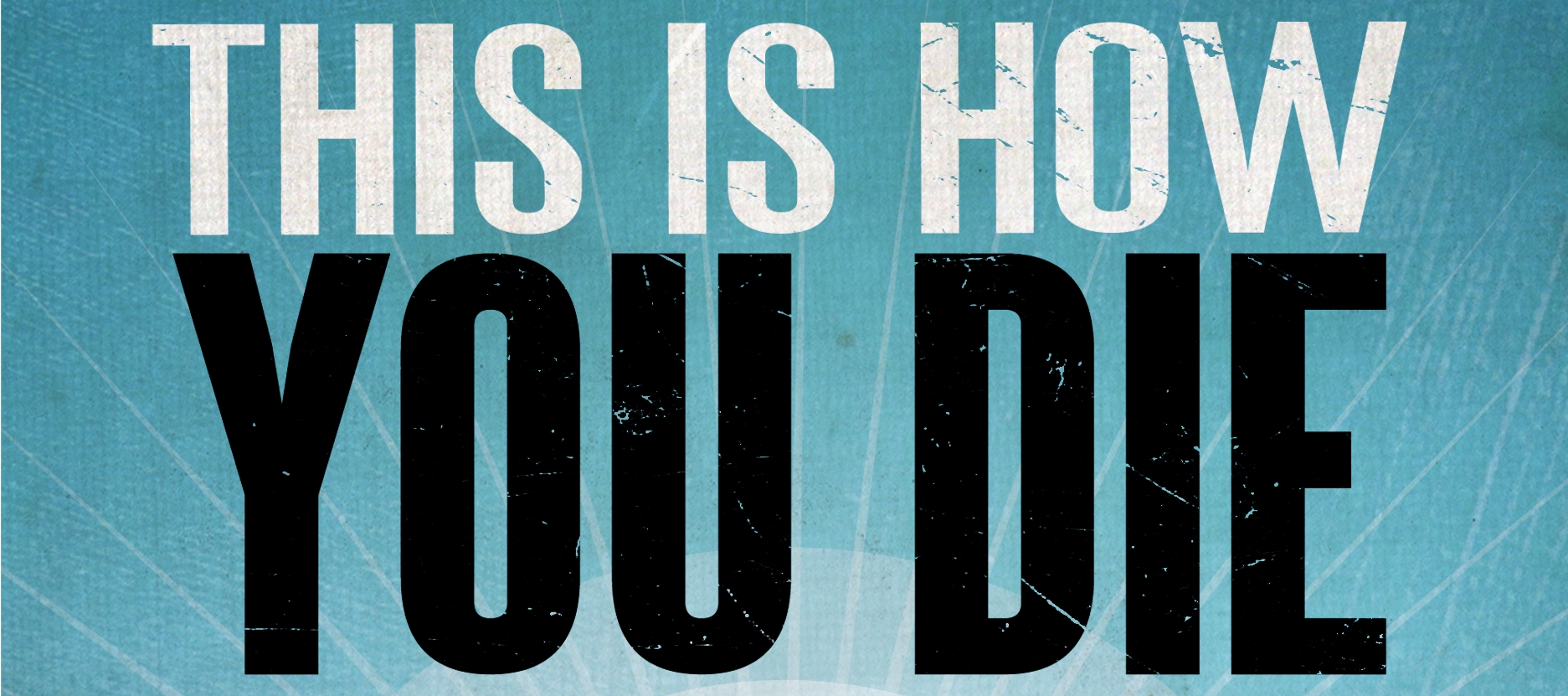
My Short Story For The Second Machine Of Death Collection
My second piece of published fiction will be out in July this year, as part of This Is How You Die: the second collection of stories about a machine that can predict your death. (My first was a story in the original collection, and you can read it here).
But! Editor David Malki is also Kickstarting a card game based on the same concept, and since it’s blown its funding goal by over 1000%, they’re releasing a few stories from the anthology to say thanks.
One of them is mine! You can read it now! Here it is!
It’s about a supervillain’s henchman tasked with the job of having their enemies killed in a way that doesn’t contradict their predicted deaths. It is called: LAZARUS REACTOR FISSION SEQUENCE!
If you can’t read it, go here.

My Short Story For The Machine Of Death Collection
“Fuck!”
It came from the den. Later I’d learn that it had followed a much quieter, “Oh fuck. Oh-“
My first thought was that it had broken. I was going to spend a lot of time, over the next five years, wishing that I’d been right about that.
He burst into the room, crunching the door hinges and smacking the handle deep into the plaster. He nearly fell over trying to stop. I didn’t say anything, just stared.
“391! He was on the train this morning! He was one of the victims!” He stared too. We just stared. “Look it up!”
I didn’t have to. I didn’t have all our test cases memorised yet, but 391 I did know: EXPLODED. Continued
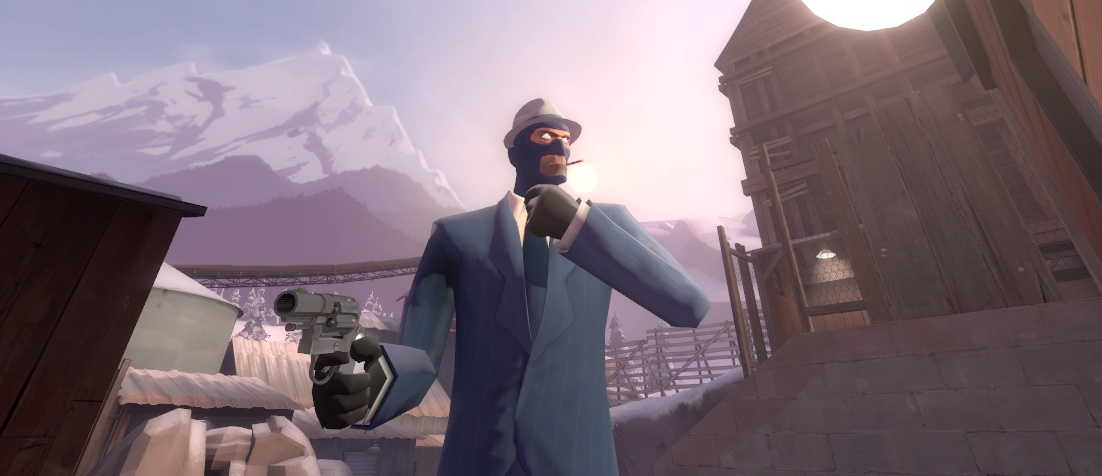
My Script For A Team Fortress 2 Short About The Spy
To commemorate my 100th hour playing as him, and since he’s clearly next in Valve’s update schedule, it seemed appropriate to take a swing at a Meet The Spy script. Continued
My Philosophy, Circa 2005
This is a sort of meandering overview of my view of humans, brains, souls, desires, and the meaning of life, written in 2005. I haven’t drastically changed my mind since then, but I have cut out a few bits that didn’t seem relevant and stuck to the point a bit better.
Some people think of themselves as just a body with a brain. Some people think of themselves as a soul: they could continue to exist even after the body and mind die. Some of these people think they had other lives, in a completely different mind and body. If you’re just a body and brain, there can’t be an afterlife or anything because the body and brain rot to nothing, they don’t go anywhere, they just die. And if you’re a soul that used to have a different mind and body, you don’t have much of a personality of your own; if you’re the common factor between these two different people, you’re a bit wishy-washy.
| These are extra bits – you don’t need to read them to get the gist of what I think, unless you do, in which case do.
There are other weird things about the soul idea: labotomies, brain damage and hemisphere separation are all physical things that can happen to the brain, and which change the person in incredibly fundamental ways. Hemisphere separation is this freaky thing that’s happened in brain damage cases where the link between the left and right parts of the brain has been severed, but both have gone on to function independently. The left hemisphere controls the right arm and the left eye, and similarly for the right hemisphere, and they got a person with this to do all kinds of crazy tests. In one, they showed the person a pencil on the right edge of their vision and asked them to write what they saw. The left part of the brain saw the pencil and made the right hand write ‘PENCIL’, but by the time it got to P and the vertical line of the E, the other half of the brain (which could see what was being written because it controlled that half of the vision) thought it was going to write ‘PIPE’ and – because it too was trying to answer the person’s question, but hadn’t seen anything – tried to draw a pipe (that half isn’t very good at writing). The other hand scribbled out its drawing and wrote ‘PENCIL’ beneath it. Is there just one soul at work here? You and I are distinct, and on that basis I assume we can’t share a single soul; at least, if there’s only one soul between us, it cannot be what I am and what you are, because we’re two different things. So since the two hemispheres are now distinct from one another – one can know something the other doesn’t, one can think something without the other knowing it – they can’t still be one soul, because they’re two different thinking entities. If there are two souls at work after hemisphere separation – if we’ve split the soul – then why call it a soul? Why not change the word to ‘brain’ or at least ‘mind’, if the soul is going to be dependent on what physically happens to the brain? Even if you want to keep calling it a soul, there can’t be an afterlife or anything: if splitting the brain into two thinking entities turns your soul into two souls, destroying the brain completely must surely turn your soul into no souls at all. We now know too much about the relationship between the brain and the psychological behaviour of a person to uphold a reasonable philosophy about souls. Either a soul has nothing to do with who you are – in which case who cares? – or it shadows what happens to the brain, in which case there’s no reason to suppose it’s a separate entity. Keep calling the mind a ‘soul’ if you like, but it’s going to get confusing when you’re talking to people who think of them as totally separate things. |
||
| A human body and brain is physically a lot like an animal body and brain. I mean, a cat and a dog have more in common, but our make-up is more like theirs than it is a privet bush, for example. They also act alike; again, not as much as they do each other, but a lot relative to the established point of comparison, the privet bush. We fight for survival, eat, drink and mate. We go about them in very different ways to animals, but our objectives are exactly the same: survive, reproduce successfully.
The meaning of life has a lot to do with what you are: if you were a soul, the meaning of your life could have something to do with a non-physical realm, some spiritual purpose or meaning. If you’re just a body and brain, the meaning of your life is to have kids and make sure they do okay. A big part of making sure your kids do okay is making sure they’re strong and attractive. Some parts of that can be done before conception, so we instinctively feel pretty strongly about hooking up with the mate with the best genes we can get. Virtually the only thing we feel more strongly about is protecting the kids after birth, and both those things are called love. If we’re an animal and not a soul, the meaning of our lives is to find the best possible mate and ensure our childrens’ survival. Which in non-animal terms is more commonly phrased as “follow your heart’s desire, settle down and do right by your family”. |
||
| Your heart’s desire is your genes’ desire, and the more powerful, immediate and inarticulatable the feeling, the more it has to do with your genes’ feelings about the look of someone else’s genes. All feelings and emotions tell you that you want or don’t want something, and what you instinctively want is always what’s best for your genes, or the species.
It’s a rather undignified idea, but there’s absolutely no doubt about it, and it’s so universally manifested that it’s impossible to understand humans in even the most rudimentary way until you accept this. Most people’s answer to this is not to understand humans in even the most rudimentary way. This is why things go so wrong. But this isn’t even to say passionate desire and stuff are superficial – appearences matter enormously to the welfare of your future children; not only do the offspring of you and an attractive partner have a better chance of being healthy and robust, but they also conveniently have a much better chance of being attractive themselves, making grandchildren more likely and more healthy. But both the physical and the metaphorical ‘heart’ are parts of a human that have no fundamental differences from those of an animal. You might say the difference is the mental stuff, obviously, what they’re like personality-wise. That stuff’s important. But if someone with the same personality as your partner had showed up in your life, but was the wrong gender, would you have fallen in love with them? |
||
| So when people think what separates us from animals is our capacity to love, or to care so much about our offspring, they’re exactly wrong. That’s what we have in common. If people think it’s God, or souls, that would be true if such things were coherent concepts, but as I say, I can’t see a tenable belief set that gives those any practical meaning.
Some people think we are, essentially, animals. Say what you like about that view, it’s philosophically full-proof. I think they’re right, to a large extent, and it’s not a bad thing really. Animals are okay. They sometimes get the things they want, and they seem to enjoy that. Other times they just eat rotten fruit or catnip until they pass out, and that’s fun too. I don’t think we’re fundamentally different from animals. But that eating rotten fruit and catnip is where we’ve really gone to town. We’ve looked at the Skinner box our genes have put us in – achieve biological imperative, get a rush of endorphins – and figured out how to bypass it. We’ve found the endorphin stash, and we don’t have to press the lever to get it anymore. We can trigger pleasure with entertainment, to a far greater extent than animals typically do. That doesn’t make us better than animals, it may even be a defect. We still follow biological imperatives because they trigger stronger desires than most entertainment does at the moment – there’s no videogame we want more than the person we have a crush on, and it’ll be a scary day when there is. For now it just gives us some breathing room, the ability to take time off from chasing what our genes want without going mad with boredom or frustration. Most of us are able to recognise and compartmentalise strong emotions like hunger, lust, or anger, and decide whether to act on them. We don’t rape everyone we fancy, and we don’t hit everyone we hate. It’s a sliding scale, and animals are on it too, we’re just a lot further from that untamed baseline. And the interesting point on that scale is: when can you entirely ignore your biological imperatives to do things like reproduce? |
||
| We don’t rape everyone we fancy, and we don’t hit everyone we hate. But we do let the drives behind those emotions influence us to a depressing extent, usually without realising it. We pay more attention to attractive people, and perceive the things they do as more interesting and worthwhile than if they were done by someone else. We let our desire to protect our children distort our view of others and their intentions. We let the intensity of love obfuscate its causes, and prevent us from analysing its significance. And some people let attraction override fidelity.
Our unwillingness to see any of these things in evolutionary terms, to believe that we operate on the same logic as an animal, is what’s preventing us from recognising them and stopping them when they’re destructive. |
||
| I think I am an animal with the ability to step back, recognise that I am an animal, and stop acting like one if it’s not going to be fun. A piloted animal. So the meaning of my life is just the fun part. Whether obeying animal instincts or shortcutting them with entertainment is the best route to it, the pleasure that used to be a bribe is now the ultimate goal.
It’s a pretty simple conclusion, and one lots of people come to by a shorter route. The only advantage of looking at it this way is to be clearer about why you feel and want the things you feel and want, and to be smarter in calculating whether they’ll ultimately lead to more happiness or less.
My Idea For An ‘Unconventional Weapon’ GameI was ill for a few weeks recently, and Ludum Dare happened during it. As usual I wanted the challenge of thinking up an idea to fit the theme, but couldn’t spare the two days to actually make something. The theme was ‘an unconventional weapon’, so I wrote up an idea but didn’t get around to publishing it at the time. Here it is! Continued
My GoateeMy choice for Game Of The Year just went up over at the PC Gamer part of CVG. I’m ashamed to say the master of stealth in the shot above is not me – though I did take it. For a while I changed my Steam ID to “i was a spy all along lol” to accentuate the frustration my victims presumably feel when the friend next to them turns out not to be called what they thought they were called and not in fact a friend of any kind. Since your real name is never displayed to your enemies while in disguise, my choice makes more sense, but I have to admit this guy’s has the edge in screenshots. The gist of my justification is this: The Spy. Although I myself have never played the class, I hear it’s a lot of fun.
|
